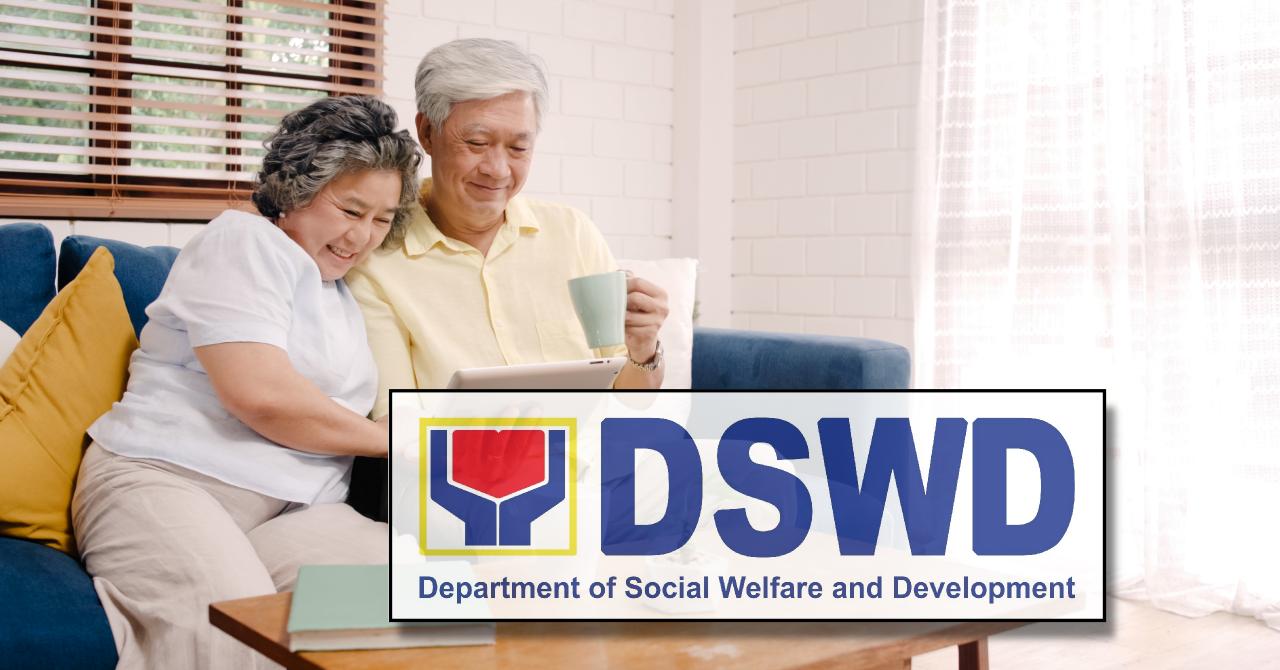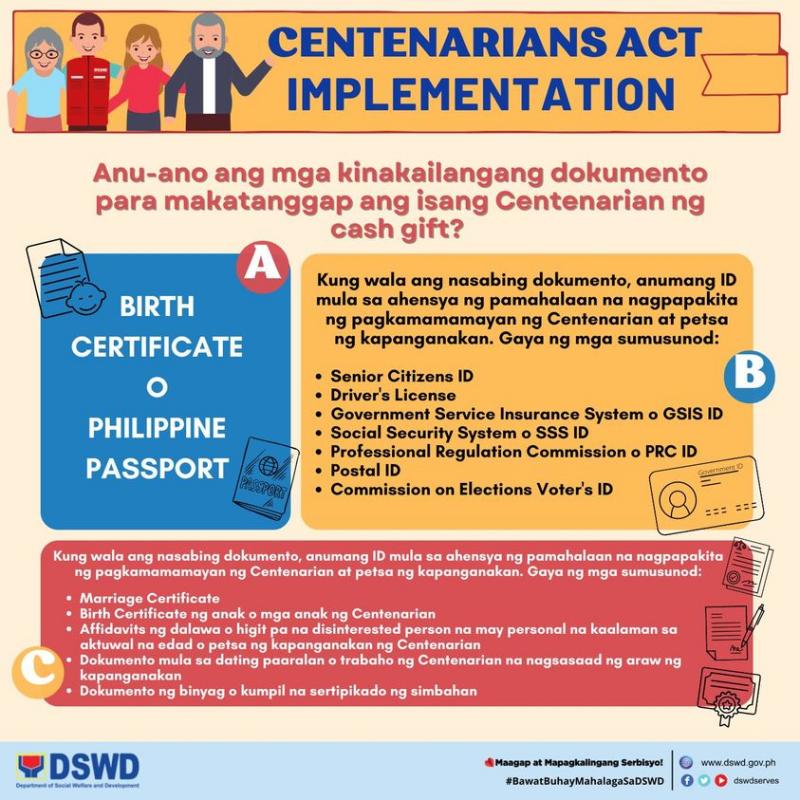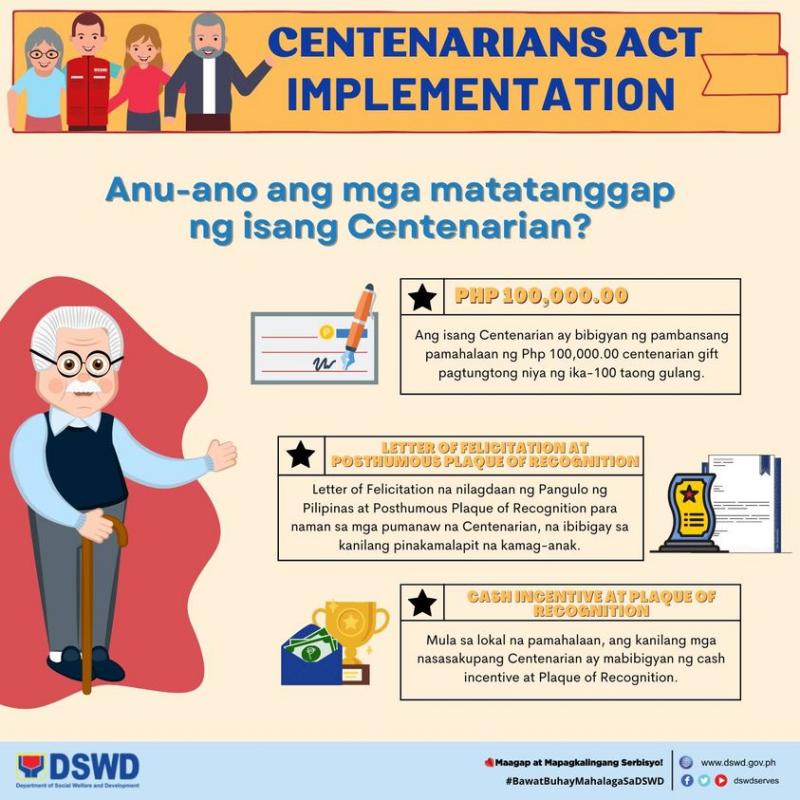Every year, the Philippines celebrates Elderly Filipino Week (EFW) during the first week of October. As part of the celebrations, the first Sunday of the month is declared as “National Respect for Centenarians Day,” a day that honors centenarians for their longevity.
Notably, one of the positive traits of Filipinos is respect for the elderly. Our government provides special benefits for senior citizens, or those age 60 years old and above. Moreover, there’s the Centenarian Program, which we will be discussing in today’s feature article.

What is DSWD Centenarian Program?
A few years ago, Republic Act 10868, also known as the Centenarian Act of 2016, was issued. Specifically, it is more formally called “An Act Honoring and Granting Additional Benefits and Privileges to Filipino Centenarians, and for Other Purposes.”
Based on this Act, the Centenarian Program is implemented by the Department of Social Welfare and Development (DSWD) — Central Office and Field Offices — together with Local Government Units (LGUs) across the Philippines.
Benefits of Centenarians
What are the benefits of centenarians under the program? According to Republic Act 10868, Rule V, Article 5.1, each centenarian shall receive:
- Centenarian’s Gift of PHP 100,000; and
- Letter of Felicitation signed by the President.
For deceased centenarians, a Posthumous Plaque of Recognition will be awarded by the DSWD, to be received by the centenarian’s nearest surviving relative.
In addition to the above benefits, which will come from the national government — the centenarian will also receive a Plaque of Recognition and Cash Incentive from the city or municipal government where he/she resides.
Qualifications
The Centenarian Program caters to all Filipinos — whether residing in the Philippines or abroad — who have reached 100 years old and above.
Requirements
To avail of the benefits of the program, a centenarian needs to submit the following documents to the city or municipal government. The application will then be endorsed to the DSWD Field Office.
- Birth Certificate; or
- Philippine Passport.
In the absence of the above documents, any of the following primary IDs may be submitted:
- Senior Citizen ID or Office of the Senior Citizens Affairs (OSCA) ID;
- LTO-issued Driver’s License;
- SSS ID;
- GSIS ID;
- PRC License;
- Postal ID;
- Voter’s ID or COMELEC certification; or
- Other IDs that indicate Filipino citizenship and year of birth.
In the absence of the above primary IDs, any two (2) of the following secondary documents may be submitted:
- Marriage Certificate;
- Children’s Birth Certificate;
- Baptismal or Confirmation Certificate;
- Old School or Employment Records; or
- Affidavit of at least two (2) Disinterested Persons.
Filipino centenarians who are residing abroad can submit valid IDS that are duly recognized by their country of residence, and verified by the Philippine Embassy. Their documents will be submitted to the Commission on Filipinos Overseas (CFO), in coordination with the Department of Foreign Affairs (DFA).
Steps Involved in the Centenarian Program
The Centenarian Program involves several major steps: identification, verification, and notification of beneficiaries, before the releasing of awards and incentives.
Identification of Beneficiaries
At the community level, target beneficiaries will be identified based on records of the Office of Senior Citizens Affairs (OSCA), social pension beneficiaries, Listahanan, and other similar databases. The same goes for those who are living in residential care facilities, including public as well as privately-run facilities.
Meanwhile, Filipino centenarians abroad shall be identified based on the records of the Commission on Filipinos Overseas (CFO).
Verification of Beneficiaries
Once the beneficiaries have been identified, they will undergo verification. During this stage, the centenarian shall present his/her Birth Certificate or Philippine Passport. The process will be done by the City or Municipal Social Welfare and Development Officer (C/MSWDO), in coordination with the OSCA Head.
In absence of either the Birth Certificate or Philippine Passport, the centenarian may submit other primary or secondary IDS (please see “Requirements” above).
Then, the C/MSWDO will submit a consolidated and verified list of centenarians to the city or municipality, with supporting documents. These will be endorsed to the concerned DSWD Field Office.
The DSWD Field Office may request to cross-check the list with the social pension database or similar lists. Afterwards, the list will be finalized and submitted to the DSWD Central Office.
Notification of Beneficiaries
Once the applications have been finalized, the DSWD Field Office will provide the C/MSWDO and OSCA with the final list of centenarians in the city or municipality.
In turn, the C/MSWDO will notify — through writing — the centenarian and/or the family. All documents shall be copy furnished to the OSCA and/or to residential care facilities (if applicable).
Release of Awards and Incentives
The Centenarian’s Gift (PHP 100,000) and Letter of Felicitation will be awarded by the DSWD Field Office to the centenarian on the first Sunday of October (National Respect for Centenarian’s Day) or on the actual day of his/her 100th birthday, whichever comes first. Likewise, the LGU will award the Cash Incentive and Plaque of Recognition to the centenarian on the same day as well.
Meanwhile, the Posthumous Plaque of Recognition for deceased centenarians will be presented by the DSWD Field Office to the nearest surviving relative.
DSWD Infographic Guide About Centenarian Program
Here are some infographics shared by the DSWD regarding the Centenarian Program. Written in Filipino, these infographics present the benefits of centenarians, as well as the documents required to avail of such benefits.

Video: Cash Incentive Awarded to 110-Year-Old Filipina
Here is a video shared by DSWD, featuring Lola Antonia, who hails from Trento, Agusan del Sur. At 110 years old, she is still going strong! She is one of the beneficiaries of the Centenarian Program, who received PHP 100,000 as cash incentive:
Frequently Asked Questions (FAQs)
Meanwhile, here are some commonly asked questions — and answers — about the Centenarian Program of DSWD:
1. What is DSWD Centenarian Program?
The Centenarian Program is based on Republic Act 10868 or the Centenarian Act of 2016. It is an act that honors and grants additional benefits and privileges to Filipino centenarians, or those who have reached 100 years old and above.
2. Who is in charge of implementing the program?
The Centenarian Program is implemented by the DSWD through its Central Office and Field Offices, in coordination with LGUs across the country.
3. What are the benefits of centenarians?
Based on Republic Act 10868, centenarians will receive a Centenarian’s Gift of PHP 100,000 and a Letter of Felicitation signed by the President. For deceased centenarians, a Posthumous Plaque of Recognition will be awarded, to be received by the centenarian’s nearest surviving relative.
Furthermore, centenarians will also receive a Cash Incentive and Plaque of Recognition from the city or municipality where they reside.
4. What are the requirements?
To avail of the program’s benefits, centenarians need to submit either their Birth Certificate or Philippine Passport to the city or municipal government, which will endorse the application to the DSWD Field Office.
In the absence of the above documents, centenarians can submit their Senior Citizen ID or OSCA ID, or other government-issued primary IDS. If they don’t have these documents, they may submit two (2) secondary documents, such as their Marriage Certificate, Children’s Birth Certificate, and Baptismal or Confirmation Certificate.
As for Filipino centenarians who are living abroad, they can submit valid IDs that are recognized by their country of residence and verified by the Philippine Embassy.
5. What are the steps involved?
The Centenarian Program involves identification, verification, and notification of program beneficiaries. These steps involve coordination between the C/MSWDO, OSCA Head, residential care facilities (if applicable), city or municipal government, DSWD Field Office, and DSWD Central Office.
Afterwards, the awards and incentives are released. The DSWD Field Office awards the Centenarian’s Gift (PHP 100,000) and Letter of Felicitation to the centenarian on the first Sunday of October (National Respect for Centenarian’s Day) or on the actual day of his/her 100th birthday, whichever comes first. On the same day, the LGU awards the Cash Incentive and Plaque of Recognition to the centenarian.
As for deceased centenarians, the DSWD Field Office will present the Posthumous Plaque of Recognition to the nearest surviving relative.
Contact Information: DSWD Central Office
If you are based in the National Capital Region (NCR) and you’d like to know more about the Centenarian Program, you can get in touch with the DSWD Central Office through their contact details, as follows:
Address: DSWD Central Office, Batasang Pambansa Complex, Constitution Hills, Quezon City, Philippines, 1126
Telephone: (02) 8931 8101 to 07
Email: inquiry@dswd.gov.ph
Website: https://www.dswd.gov.ph/
Facebook: https://www.facebook.com/dswdserves/
NOTE: Aside from the DSWD Central Office in Quezon City, the department has Field Offices nationwide. Here is the link to the directory of DSWD Field Offices, including the telephone number and website of each office.
Google Map Location
The DSWD Central Office is located in Quezon City. Below is the office’s location on Google Maps, for your reference:
Summary
Reaching 100 years old is a huge milestone — an event that should be celebrated not only by centenarians, but by their families and friends, too. There are so many things that we can learn from the elderly, and they deserve much respect and recognition. Indeed, it is only fitting that Filipino centenarians benefit from the DSWD’s Centenarian Program!
DISCLAIMER: We hope that the above guide has been helpful, especially if a member of your family will soon be a centenarian! Please note that this guide is presented for general, information-sharing purposes only. To learn more about the Centenarian Program, including the qualifications, requirements, and steps involved, please visit the official website and Facebook page of DSWD.
READ NEXT: How to Apply for DSWD Solo Parent Cash Assistance
